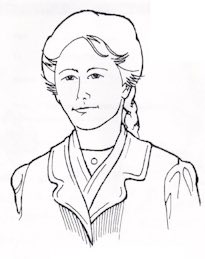Kate Mullany, a leading female labor organizer in the nineteenth century, worked for justice and opportunities for women in newly emerging industries after the Civil War.
Immigrating to Troy, New York, from Ireland with her family, Mullany had to go to work in the local laundry at the age of nineteen when her father died. Kate became the primary source of her family’s income. She worked 12 to 14 hours a day, six days a week, for about $3 a week. And if she damaged a shirt or a collar, the company reduced her wages to pay for the damages.
Mullany was unwilling to accept the low wages and dangerous, unhealthy working conditions at the laundry. Therefore, only a few months after she went to work in 1864, she founded the Collar Laundry Union, the first bona fide female union in the country. She then led a strike of two hundred laundresses, protesting menial wages and unsafe working conditions. Her efforts led to a twenty-five percent wage increase.
Mullany’s efforts were recognized not only by women workers, but also by male labor organizers. In 1868, she was appointed an assistant secretary of the National Labor Union, making her the first female to hold a national labor position. Later, she led the efforts to form a laundry cooperative as well as a cooperative to manufacture collars and cuffs in order to shift ownership and control to the workers. Due to economic conditions and great pressure from the factory owners, these efforts failed. Still, Mullany remained a prominent labor union leader. As such, she worked to improve the economic lives of countless working-class women, while, during the same era, middle-class women’s suffragists were focused on political rights.
Mullany recognized the connection between the struggle for economic and political rights. With no political power, women laundresses had no ability to pressure leaders to enact needed protective legislation. While Mullany was identified primarily as a workers’ advocate rather than a women’s rights advocate, she worked with suffragists, such as Susan B. Anthony, to further the interests of women wage earners and all trade unionists – male and female.
As a labor leader and organizer, Mullany is one of early American labor history’s most important women.

